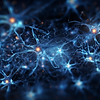
OUR SCIENCE
Lario Therapeutics' principal focus is to develop breakthrough medications for severe neurodevelopmental syndromes.
Caused by gain-of-function mutations in the CACNA1E gene which encodes CaV2.3 a voltage-gated calcium channel in brain. The excessive activity of this excitatory channel is thought to drive the severe seizures and lead to the profound developmental delay characteristic of this syndrome.
Developmental Epileptic Encephalopathy Type 69 (DEE 69)
KEY FOCUS 1

High Unmet Clinical Need
Lario Therapeutic's key focus is the development of first-in-class therapies for severe paediatric epilepsies for which there is no well-established standard of care. As detailed above, DEE2 and DEE69 are rare genetic syndromes that appear during early childhood. Both of these disorders are characterised by treatment-resistant forms of epilepsy, profound developmental delay and movement difficulties. There are very limited treatment options and currently no disease modifying therapies available.
This disorder is caused by loss-of-function mutations in the CDKL5 protein kinase expressed in brain. A leading hypothesis is that CDKL5 regulates the function of the CaV2.3 channel. The link between CDKL5 and CaV2.3 can explain the devastating seizures characteristic of CDKL5-deficiency disorder.
Developmental Epileptic Encephalopathy Type 2 (DEE2) or CDKL5-deficiency disorder
KEY FOCUS 2

A key function of the CaV2.3 channel is to excite neurons in the brain. During seizures, CaV2.3 channels contribute to the excessive excitation characteristic of epilepsy. In addition to the rare genetic forms described above, there is a significant evidence that this channel is a promising novel target for controlling seizures in various drug-refractory forms of epilepsy.
Drug Refractory Epilepsies (DRE)
BROADENING THE APPROACH

An extensive literature links calcium channels to Parkinson’s disease pathology. It has been also demonstrated in preclinical studies that the deletion of CaV2.3 can protect against an experimental form of Parkinson’s disease. This potential suggests that selective CaV2.3 inhibition could be a novel and disease-modifying approach in Parkinson's disease.
Parkinson's Disease
ADDITIONAL OPPORTUNITIES IN NEUROLOGY
